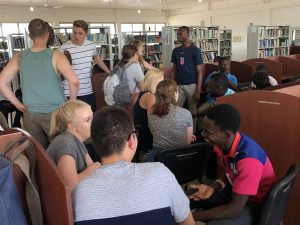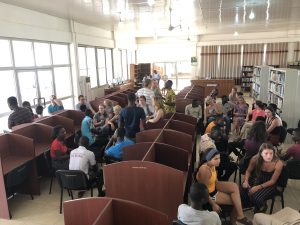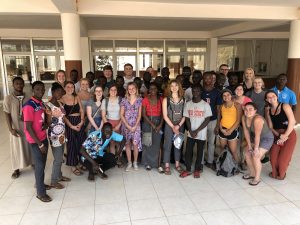Blogpost Jan 17
Today, as usual, we woke up early for breakfast. Well, most of us did. Two of us overslept and two were sick. Breakfast was at the usual place but afterwards the group stopped by the shop of the man who sold Vanessa a defective bag – attempting to get a refund. After some persuasion from Prof. Abdulai and Jay-Z, they were successful in receiving the refund.
We then picked up those who were left behind and headed to the University for Development Studies, Nyankpala campus, to meet a group of college students. Upon arrival, we were introduced to the dean of students, Dr. Raphael Adu-Gyamfi, who brought us to the library with the group of local students.

After an icebreaker, we had some time to just chat with those who were sitting around us, talking to them about a variety of topics including the silences inherent in discussions of the slave trade, and Slavery and what it is like to live in a communal society, and what different people were studying in school.

After this short conversation, we regrouped, and led by Prof. Iddrisu we talked in a more formalized setting. Right off the bat, we got into a conversation about the lack of acknowledgement of Ghana’s (and in particular, the Northern Region’s) role in the historical slave trade. One student discussed the problematic ways that some Ghanaian students are taught about the history of slavery: it’s collapsed into a social science discipline and taught only as a topic at the Jnr High school (Middle School), and at the University it’s taught through African Studies, a required subject for all students, but where slavery is only one of the topics. Their understanding that slavery began in Northern Ghana after colonization, and as part of debt payment was highly concerning, for our visits to Slave markets (Saakpuli, Pikworo and Salaga) that date as far back to the 17th and 18th centuries made these more complicated.
Some aspects of the conversation, and that also stood out, are captured below:
1. Some of the Ghanaian students talked about how the discussion of slavery is no longer relevant because what happened is in the past and there are more important issues to learn and discuss in today’s society. For some, their education should be focused on what to bring to the dining table, and learning about the history of slavery does not apply to the specialized education that these students receive.
2. We also discussed the fact that there are situations around the world today that constitute modern-day slavery. Examples include sex-trafficking around the world, the exploitation of those with no immigration status, and slavery in Libya.
3. One of the students talked about how one of his professors, not at UDS, had an incredibly negative view of white people, introducing a discussion surrounding the different dynamics in racial relations both in Ghana and in the United States. Prof. Abdulai made a point to discuss the fact that we do not blame a child for the sins of their parents, and that very many segments of society were complicit in the slave trade and one can not just blame Europeans, who definitely had African collaborators, though not all Africans were collaborators. And more so, the world religions of Islam and Christianity used the scripture to justify historical slavery and no one has yet abandoned his religion because of its previous involvement in the slave trade. Pope John Paul II, on a visit to the “Gate of No Return” at Goree Island, apologized for the role of the church in the slave trade. And Mandella also wept on a visit to the same place. A demonstration, according to Prof. Iddrisu, quoting from his chapter on “History of Evil: The African Slave Trade” of the goodness in humanity and that every generation has to deal with the burden of the obnoxious institution of Slavery and the slave trade.
4. Following this discussion, we got into talking about the reality of conditions of the United States and Europe. Before traveling to the United States, Tina (St. Olaf), before trading to America, had heard that there were no homeless people in the streets of the U.S. and that the H.I.V. virus did not exist in the states. Many of the students said that they had heard similar things and both Abdulai and Tina warned the students not to over-idealize America and that they can be happy and successful no matter where they are in the world, just remember to work hard and not be deceived by Hollywood on your screens.

This talk was incredibly valuable in our study of how the people in Ghana see and talk about (or don’t talk about) the issue of slavery. We meet some incredible people and even exchanged email addresses so that we can stay in contact. Our visit was concluded with the usual picture and walked to their cafeteria to buy the students lunch as a “thank you” for taking the time to talk to us.
We drove to Miliki Cool for lunch before heading back to the hotel to relax for the day. While at the hotel, we got to witness some of the most prominent news that has been covered while we have been here in Tamale. Many of the parties that were attending the funeral in Yendi were back on the road, heading home to resume life as usual. Hundreds of people were crammed inside and on-top of huge trucks flying down the freeway, banging on drums and whopping with excitement.
Great day. Great company. Great food. Great trip.
Love,
Ty, Katie, Zeeba, and Ben.
